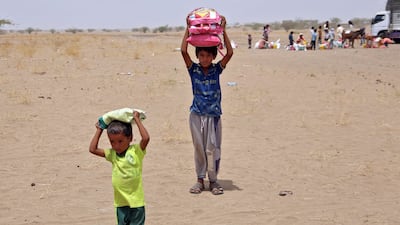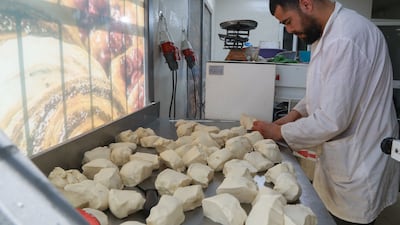The start of Ramadan is a particularly inopportune time for food prices across most of the Middle East to be surging. But this was the case last year, compounded by the Covid-19 pandemic, and it is happening again this Ramadan, to an even greater degree in no small part due to the Ukraine conflict. On top of that, longer-term economic crises have not gone away, particularly in global supply chains.
Just the past week has seen a number of stories that highlight the complexity and scale of the problem. Prices are rising globally, including in richer countries. But in the Middle East, where many were already struggling, they are being felt acutely. Ahmed El Gizawy, a construction worker in Cairo, told The National: “This Ramadan, no one’s thinking about Covid ... What is on everyone’s minds are the rising prices nationwide. Even bread is expensive now. Many people, me included, are really struggling." In Lebanon, a shortage of sunflower oil has led to supermarkets rationing supplies, which they are also doing with flour and sugar. This is little surprise. Together, Ukraine and Russia supply 75 to 80 per cent of the world's sunflower oil.
It is not just food prices putting a strain on families preparing for celebrations, but energy ones as well. Lina, a Jordanian mother of two, said her family were also stocking up on increasingly expensive gas canisters for cooking.
For the least fortunate, the issue is reaching crisis levels. David Beasley, executive director of the UN's World Food Programme, recently told the UN Security Council that Yemen, Egypt and Lebanon are facing a food "catastrophe" as a result of the Ukraine conflict. This is despite 2 million Yemeni children already being acutely malnourished, according to Unicef, the UN's children agency, and 80 per cent of Lebanese people living under the poverty line. Mr Beasley has said the Ukraine conflict will increase the agency’s monthly expenses by $71m because of rising costs all round.
Fortunately, some governments are jumping into action. Egypt, which is often the largest importer of wheat globally, will send a delegation to India in early April to boost imports. It is in similar conversations with the US, France and Argentina. They are needed; as much as 85 per cent of the country's current supply comes from Russia and Ukraine. And even if talks are successful, the challenge will not end there. Opening a relatively novel trade route with, for example, Argentina will take time, particularly amid the crisis in supply chains.
The global food trade is being shaken up, then, and as traditional routes diminish, new ones could open. But there is increasing belief among experts that old certainties on the resilience of international trade are out-of-date. Larry Fink, co-founder and chief executive of BlackRock, the world's largest investment manager, has said the Ukraine conflict spells the end of an era of globalisation, and will make countries "re-evaluate their dependencies and re-analyse their manufacturing and assembly footprints – something that Covid-19 had already spurred many to start doing". This is a more general observation about the changing nature of global trade, but food and energy will be key areas affected by the trend, and many uncertainties remain. On Tuesday, Mohammed Al Gergawi, UAE Minister of Cabinet Affairs, told the World Government Summit that the world is “facing more question marks than answers”, with a particular challenge being "frightening and massive" acceleration in inflation, which has quadrupled in the last two years.
Writing about 2021's rise, The National referenced the UN’s Food and Agriculture Organisation reporting last March that food prices had risen by 2 per cent compared to the previous month, a 10th consecutive monthly rise. The mood was further dampened by ongoing wariness and restrictions on family gatherings due to the pandemic, such a crucial aspect of Ramadan celebrations. In an unfortunate twist of fate, as fears over Covid-19 have diminished, fears over food prices have become more acute in a number of Muslim-majority countries, making this month's festive season, once again, a difficult one for many.
Emergency
Director: Kangana Ranaut
Stars: Kangana Ranaut, Anupam Kher, Shreyas Talpade, Milind Soman, Mahima Chaudhry
Rating: 2/5
The five pillars of Islam
1. Fasting
2. Prayer
3. Hajj
4. Shahada
5. Zakat
FIXTURES
Thursday
Dibba v Al Dhafra, Fujairah Stadium (5pm)
Al Wahda v Hatta, Al Nahyan Stadium (8pm)
Friday
Al Nasr v Ajman, Zabeel Stadium (5pm)
Al Jazria v Al Wasl, Mohammed Bin Zayed Stadium (8pm)
Saturday
Emirates v Al Ain, Emirates Club Stadium (5pm)
Sharjah v Shabab Al Ahli Dubai, Sharjah Stadium (8pm)
Multitasking pays off for money goals
Tackling money goals one at a time cost financial literacy expert Barbara O'Neill at least $1 million.
That's how much Ms O'Neill, a distinguished professor at Rutgers University in the US, figures she lost by starting saving for retirement only after she had created an emergency fund, bought a car with cash and purchased a home.
"I tell students that eventually, 30 years later, I hit the million-dollar mark, but I could've had $2 million," Ms O'Neill says.
Too often, financial experts say, people want to attack their money goals one at a time: "As soon as I pay off my credit card debt, then I'll start saving for a home," or, "As soon as I pay off my student loan debt, then I'll start saving for retirement"."
People do not realise how costly the words "as soon as" can be. Paying off debt is a worthy goal, but it should not come at the expense of other goals, particularly saving for retirement. The sooner money is contributed, the longer it can benefit from compounded returns. Compounded returns are when your investment gains earn their own gains, which can dramatically increase your balances over time.
"By putting off saving for the future, you are really inhibiting yourself from benefiting from that wonderful magic," says Kimberly Zimmerman Rand , an accredited financial counsellor and principal at Dragonfly Financial Solutions in Boston. "If you can start saving today ... you are going to have a lot more five years from now than if you decide to pay off debt for three years and start saving in year four."
The biog
First Job: Abu Dhabi Department of Petroleum in 1974
Current role: Chairperson of Al Maskari Holding since 2008
Career high: Regularly cited on Forbes list of 100 most powerful Arab Businesswomen
Achievement: Helped establish Al Maskari Medical Centre in 1969 in Abu Dhabi’s Western Region
Future plan: Will now concentrate on her charitable work
Mercer, the investment consulting arm of US services company Marsh & McLennan, expects its wealth division to at least double its assets under management (AUM) in the Middle East as wealth in the region continues to grow despite economic headwinds, a company official said.
Mercer Wealth, which globally has $160 billion in AUM, plans to boost its AUM in the region to $2-$3bn in the next 2-3 years from the present $1bn, said Yasir AbuShaban, a Dubai-based principal with Mercer Wealth.
“Within the next two to three years, we are looking at reaching $2 to $3 billion as a conservative estimate and we do see an opportunity to do so,” said Mr AbuShaban.
Mercer does not directly make investments, but allocates clients’ money they have discretion to, to professional asset managers. They also provide advice to clients.
“We have buying power. We can negotiate on their (client’s) behalf with asset managers to provide them lower fees than they otherwise would have to get on their own,” he added.
Mercer Wealth’s clients include sovereign wealth funds, family offices, and insurance companies among others.
From its office in Dubai, Mercer also looks after Africa, India and Turkey, where they also see opportunity for growth.
Wealth creation in Middle East and Africa (MEA) grew 8.5 per cent to $8.1 trillion last year from $7.5tn in 2015, higher than last year’s global average of 6 per cent and the second-highest growth in a region after Asia-Pacific which grew 9.9 per cent, according to consultancy Boston Consulting Group (BCG). In the region, where wealth grew just 1.9 per cent in 2015 compared with 2014, a pickup in oil prices has helped in wealth generation.
BCG is forecasting MEA wealth will rise to $12tn by 2021, growing at an annual average of 8 per cent.
Drivers of wealth generation in the region will be split evenly between new wealth creation and growth of performance of existing assets, according to BCG.
Another general trend in the region is clients’ looking for a comprehensive approach to investing, according to Mr AbuShaban.
“Institutional investors or some of the families are seeing a slowdown in the available capital they have to invest and in that sense they are looking at optimizing the way they manage their portfolios and making sure they are not investing haphazardly and different parts of their investment are working together,” said Mr AbuShaban.
Some clients also have a higher appetite for risk, given the low interest-rate environment that does not provide enough yield for some institutional investors. These clients are keen to invest in illiquid assets, such as private equity and infrastructure.
“What we have seen is a desire for higher returns in what has been a low-return environment specifically in various fixed income or bonds,” he said.
“In this environment, we have seen a de facto increase in the risk that clients are taking in things like illiquid investments, private equity investments, infrastructure and private debt, those kind of investments were higher illiquidity results in incrementally higher returns.”
The Abu Dhabi Investment Authority, one of the largest sovereign wealth funds, said in its 2016 report that has gradually increased its exposure in direct private equity and private credit transactions, mainly in Asian markets and especially in China and India. The authority’s private equity department focused on structured equities owing to “their defensive characteristics.”
TOURNAMENT INFO
Opening fixtures:
Friday, Oct 5
8pm: Kabul Zwanan v Paktia Panthers
Saturday, Oct 6
4pm: Nangarhar Leopards v Kandahar Knights
8pm: Kabul Zwanan v Balkh Legends
Tickets
Tickets can be bought online at https://www.q-tickets.com/apl/eventlist and at the ticket office at the stadium.
TV info
The tournament will be broadcast live in the UAE on OSN Sports.
COMPANY%20PROFILE
%3Cp%3E%3Cstrong%3ECompany%3A%3C%2Fstrong%3E%20Vault%3Cbr%3E%3Cstrong%3EStarted%3A%20%3C%2Fstrong%3EJune%202023%3Cbr%3E%3Cstrong%3ECo-founders%3A%20%3C%2Fstrong%3EBilal%20Abou-Diab%20and%20Sami%20Abdul%20Hadi%3Cbr%3E%3Cstrong%3EBased%3A%20%3C%2Fstrong%3EAbu%20Dhabi%3Cbr%3E%3Cstrong%3ELicensed%20by%3A%3C%2Fstrong%3E%20Abu%20Dhabi%20Global%20Market%3Cbr%3E%3Cstrong%3EIndustry%3A%20%3C%2Fstrong%3EInvestment%20and%20wealth%20advisory%3Cbr%3E%3Cstrong%3EFunding%3A%20%3C%2Fstrong%3E%241%20million%3Cbr%3E%3Cstrong%3EInvestors%3A%20%3C%2Fstrong%3EOutliers%20VC%20and%20angel%20investors%3Cbr%3E%3Cstrong%3ENumber%20of%20employees%3A%20%3C%2Fstrong%3E14%3Cbr%3E%3C%2Fp%3E%0A
MATCH INFO
Syria v Australia
2018 World Cup qualifying: Asia fourth round play-off first leg
Venue: Hang Jebat Stadium (Malacca, Malayisa)
Kick-off: Thursday, 4.30pm (UAE)
Watch: beIN Sports HD
* Second leg in Australia scheduled for October 10
Who's who in Yemen conflict
Houthis: Iran-backed rebels who occupy Sanaa and run unrecognised government
Yemeni government: Exiled government in Aden led by eight-member Presidential Leadership Council
Southern Transitional Council: Faction in Yemeni government that seeks autonomy for the south
Habrish 'rebels': Tribal-backed forces feuding with STC over control of oil in government territory
The specs: 2018 Range Rover Velar R-Dynamic HSE
Price, base / as tested: Dh263,235 / Dh420,000
Engine: 3.0-litre supercharged V6
Power 375hp @ 6,500rpm
Torque: 450Nm @ 3,500rpm
Transmission: Eight-speed automatic
Fuel consumption, combined: 9.4L / 100kms
Benefits of first-time home buyers' scheme
- Priority access to new homes from participating developers
- Discounts on sales price of off-plan units
- Flexible payment plans from developers
- Mortgages with better interest rates, faster approval times and reduced fees
- DLD registration fee can be paid through banks or credit cards at zero interest rates
Winners
Ballon d’Or (Men’s)
Ousmane Dembélé (Paris Saint-Germain / France)
Ballon d’Or Féminin (Women’s)
Aitana Bonmatí (Barcelona / Spain)
Kopa Trophy (Best player under 21 – Men’s)
Lamine Yamal (Barcelona / Spain)
Best Young Women’s Player
Vicky López (Barcelona / Spain)
Yashin Trophy (Best Goalkeeper – Men’s)
Gianluigi Donnarumma (Paris Saint-Germain and Manchester City / Italy)
Best Women’s Goalkeeper
Hannah Hampton (England / Aston Villa and Chelsea)
Men’s Coach of the Year
Luis Enrique (Paris Saint-Germain)
Women’s Coach of the Year
Sarina Wiegman (England)
In-demand jobs and monthly salaries
- Technology expert in robotics and automation: Dh20,000 to Dh40,000
- Energy engineer: Dh25,000 to Dh30,000
- Production engineer: Dh30,000 to Dh40,000
- Data-driven supply chain management professional: Dh30,000 to Dh50,000
- HR leader: Dh40,000 to Dh60,000
- Engineering leader: Dh30,000 to Dh55,000
- Project manager: Dh55,000 to Dh65,000
- Senior reservoir engineer: Dh40,000 to Dh55,000
- Senior drilling engineer: Dh38,000 to Dh46,000
- Senior process engineer: Dh28,000 to Dh38,000
- Senior maintenance engineer: Dh22,000 to Dh34,000
- Field engineer: Dh6,500 to Dh7,500
- Field supervisor: Dh9,000 to Dh12,000
- Field operator: Dh5,000 to Dh7,000
Profile box
Company name: baraka
Started: July 2020
Founders: Feras Jalbout and Kunal Taneja
Based: Dubai and Bahrain
Sector: FinTech
Initial investment: $150,000
Current staff: 12
Stage: Pre-seed capital raising of $1 million
Investors: Class 5 Global, FJ Labs, IMO Ventures, The Community Fund, VentureSouq, Fox Ventures, Dr Abdulla Elyas (private investment)
RESULTS
5pm: Maiden (PA) Dh80,000 2,200m
Winner: Arjan, Fabrice Veron (jockey), Eric Lemartinel (trainer).
5.30pm: Maiden (PA) Dh80,000 1,400m
Winner: Jap Nazaa, Royston Ffrench, Irfan Ellahi.
6pm: Al Ruwais Group 3 (PA) Dh300,000 1,200m
Winner: RB Lam Tara, Fabrice Veron, Eric Lemartinal.
6.30pm: Shadwell Gold Cup Prestige Dh125,000 1,600m
Winner: AF Sanad, Bernardo Pinheiro, Khalifa Al Neyadi.
7pm: Shadwell Farm Stallions Handicap (PA) Dh70,000 1,600m
Winner: Jawal Al Reef, Patrick Cosgrave, Abdallah Al Hammadi.
7.30pm: Maiden (TB) Dh80,000 1,600m
Winner: Dubai Canal, Harry Bentley, Satish Seemar.
The Bio
Amal likes watching Japanese animation movies and Manga - her favourite is The Ancient Magus Bride
She is the eldest of 11 children, and has four brothers and six sisters.
Her dream is to meet with all of her friends online from around the world who supported her work throughout the years
Her favourite meal is pizza and stuffed vine leaves
She ams to improve her English and learn Japanese, which many animated programmes originate in
In numbers: China in Dubai
The number of Chinese people living in Dubai: An estimated 200,000
Number of Chinese people in International City: Almost 50,000
Daily visitors to Dragon Mart in 2018/19: 120,000
Daily visitors to Dragon Mart in 2010: 20,000
Percentage increase in visitors in eight years: 500 per cent
Last five meetings
2013: South Korea 0-2 Brazil
2002: South Korea 2-3 Brazil
1999: South Korea 1-0 Brazil
1997: South Korea 1-2 Brazil
1995: South Korea 0-1 Brazil
Note: All friendlies
Our legal consultant
Name: Hassan Mohsen Elhais
Position: legal consultant with Al Rowaad Advocates and Legal Consultants.
Bob%20Marley%3A%20One%20Love
%3Cp%3E%3Cstrong%3EDirector%3A%3C%2Fstrong%3E%C2%A0Reinaldo%20Marcus%20Green%3C%2Fp%3E%0A%3Cp%3E%3Cstrong%3EStarring%3A%C2%A0%3C%2Fstrong%3EKingsley%20Ben-Adir%2C%20Lashana%20Lynch%2C%20James%20Norton%3C%2Fp%3E%0A%3Cp%3E%3Cstrong%3ERating%3A%3C%2Fstrong%3E%C2%A02%2F5%3C%2Fp%3E%0A
Afro%20salons
%3Cp%3E%3Cstrong%3EFor%20women%3A%3C%2Fstrong%3E%3Cbr%3ESisu%20Hair%20Salon%2C%20Jumeirah%201%2C%20Dubai%3Cbr%3EBoho%20Salon%2C%20Al%20Barsha%20South%2C%20Dubai%3Cbr%3EMoonlight%2C%20Al%20Falah%20Street%2C%20Abu%20Dhabi%3Cbr%3E%3Cstrong%3EFor%20men%3A%3C%2Fstrong%3E%3Cbr%3EMK%20Barbershop%2C%20Dar%20Al%20Wasl%20Mall%2C%20Dubai%3Cbr%3ERegency%20Saloon%2C%20Al%20Zahiyah%2C%20Abu%20Dhabi%3Cbr%3EUptown%20Barbershop%2C%20Al%20Nasseriya%2C%20Sharjah%3C%2Fp%3E%0A
Groom and Two Brides
Director: Elie Semaan
Starring: Abdullah Boushehri, Laila Abdallah, Lulwa Almulla
Rating: 3/5
Key 2013/14 UAE Motorsport dates
October 4: Round One of Rotax Max Challenge, Al Ain (karting)
October 1: 1 Round One of the inaugural UAE Desert Championship (rally)
November 1-3: Abu Dhabi Grand Prix (Formula One)
November 28-30: Dubai International Rally
January 9-11: 24Hrs of Dubai (Touring Cars / Endurance)
March 21: Round 11 of Rotax Max Challenge, Muscat, Oman (karting)
April 4-10: Abu Dhabi Desert Challenge (Endurance)
MATCH INFO
Fixture: Thailand v UAE, Tuesday, 4pm (UAE)
TV: Abu Dhabi Sports
TECH%20SPECS%3A%20APPLE%20WATCH%20SERIES%208
%3Cp%3E%3Cstrong%3EDisplay%3A%3C%2Fstrong%3E%2041mm%2C%20352%20x%20430%3B%2045mm%2C%20396%20x%20484%3B%20Retina%20LTPO%20OLED%2C%20up%20to%201000%20nits%2C%20always-on%3B%20Ion-X%20glass%3C%2Fp%3E%0A%3Cp%3E%3Cstrong%3EProcessor%3A%3C%2Fstrong%3E%20Apple%20S8%2C%20W3%20wireless%2C%20U1%20ultra-wideband%3C%2Fp%3E%0A%3Cp%3E%3Cstrong%3ECapacity%3A%3C%2Fstrong%3E%2032GB%3C%2Fp%3E%0A%3Cp%3E%3Cstrong%3EMemory%3A%3C%2Fstrong%3E%201GB%3C%2Fp%3E%0A%3Cp%3E%3Cstrong%3EPlatform%3A%3C%2Fstrong%3E%20watchOS%209%3C%2Fp%3E%0A%3Cp%3E%3Cstrong%3EHealth%20metrics%3A%3C%2Fstrong%3E%203rd-gen%20heart%20rate%20sensor%2C%20temperature%20sensing%2C%20ECG%2C%20blood%20oxygen%2C%20workouts%2C%20fall%2Fcrash%20detection%3B%20emergency%20SOS%2C%20international%20emergency%20calling%3C%2Fp%3E%0A%3Cp%3E%3Cstrong%3EConnectivity%3A%3C%2Fstrong%3E%20GPS%2FGPS%20%2B%20cellular%3B%20Wi-Fi%2C%20LTE%2C%20Bluetooth%205.3%2C%20NFC%20(Apple%20Pay)%3C%2Fp%3E%0A%3Cp%3E%3Cstrong%3EDurability%3A%3C%2Fstrong%3E%20IP6X%2C%20water%20resistant%20up%20to%2050m%2C%20dust%20resistant%3C%2Fp%3E%0A%3Cp%3E%3Cstrong%3EBattery%3A%3C%2Fstrong%3E%20308mAh%20Li-ion%2C%20up%20to%2018h%2C%20wireless%20charging%3C%2Fp%3E%0A%3Cp%3E%3Cstrong%3ECards%3A%3C%2Fstrong%3E%20eSIM%3C%2Fp%3E%0A%3Cp%3E%3Cstrong%3EFinishes%3A%3C%2Fstrong%3E%20Aluminium%20%E2%80%93%20midnight%2C%20Product%20Red%2C%20silver%2C%20starlight%3B%20stainless%20steel%20%E2%80%93%20gold%2C%20graphite%2C%20silver%3C%2Fp%3E%0A%3Cp%3E%3Cstrong%3EIn%20the%20box%3A%3C%2Fstrong%3E%20Watch%20Series%208%2C%20magnetic-to-USB-C%20charging%20cable%2C%20band%2Floop%3C%2Fp%3E%0A%3Cp%3E%3Cstrong%3EPrice%3A%3C%2Fstrong%3E%20Starts%20at%20Dh1%2C599%20(41mm)%20%2F%20Dh1%2C999%20(45mm)%3C%2Fp%3E%0A
Sri Lanka-India Test series schedule
1st Test July 26-30 in Galle
2nd Test August 3-7 in Colombo
3rd Test August 12-16 in Pallekele
RESULTS
Bantamweight: Jalal Al Daaja (JOR) beat Hamza Bougamza (MAR)
Catchweight 67kg: Mohamed El Mesbahi (MAR) beat Fouad Mesdari (ALG)
Lightweight: Abdullah Mohammed Ali (UAE) beat Abdelhak Amhidra (MAR)
Catchweight 73kg: Mosatafa Ibrahim Radi (PAL) beat Yazid Chouchane (ALG)
Middleweight: Yousri Belgaroui (TUN) beat Badreddine Diani (MAR)
Catchweight 78KG: Rashed Dawood (UAE) beat Adnan Bushashy (ALG)
Middleweight: Sallah-Eddine Dekhissi (MAR) beat Abdel Enam (EGY)
Catchweight 65kg: Yanis Ghemmouri (ALG) beat Rachid Hazoume (MAR)
Lightweight: Mohammed Yahya (UAE) beat Azouz Anwar (EGY)
Catchweight 79kg: Souhil Tahiri (ALG) beat Omar Hussein (PAL)
Middleweight: Tarek Suleiman (SYR) beat Laid Zerhouni (ALG)













